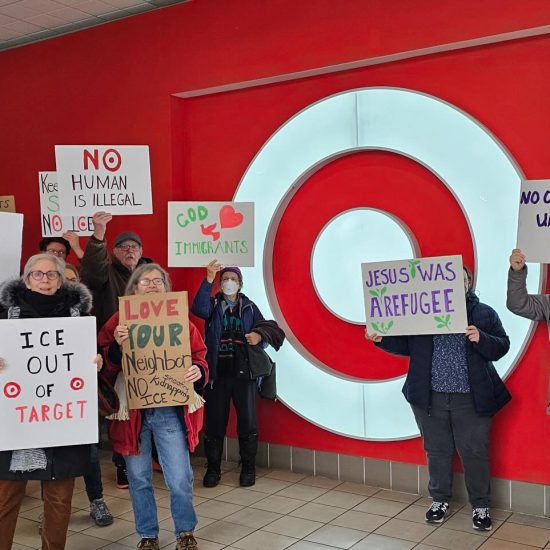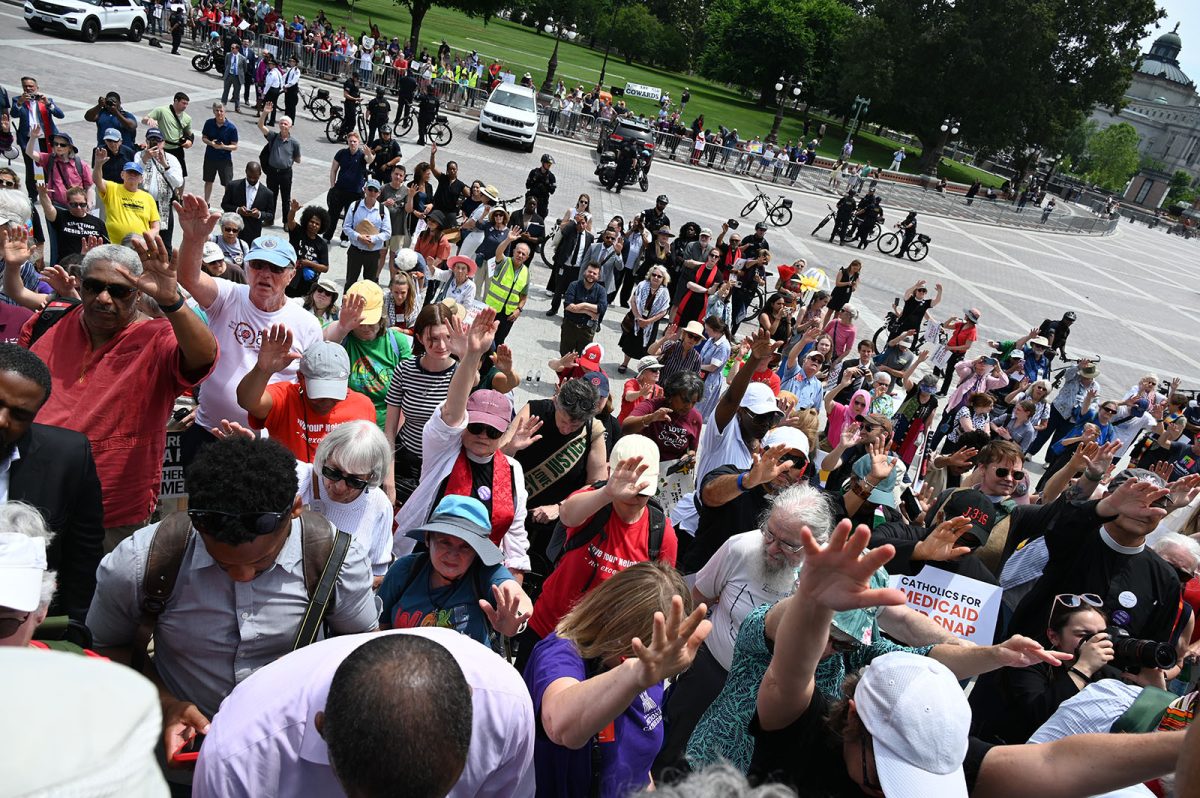
WASHINGTON (RNS) — Religious leaders are ramping up pressure on lawmakers to reject the Republican-led budget bill currently before the U.S. Senate, arguing proposed cuts to health care benefits and food assistance programs as well as provisions involving public education will disproportionately hurt low-income Americans.
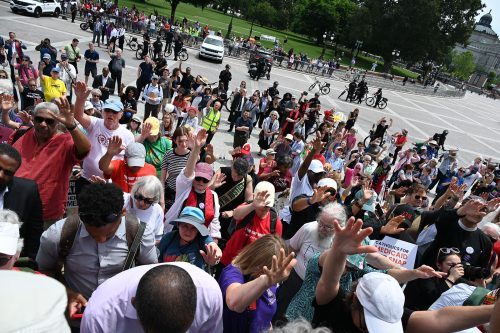
Demonstrators pray on the steps of the U.S. Capitol during a rally against the “One Big Beautiful Bill Act,” June 10, 2025. (RNS photo/Jack Jenkins)
Part of an effort that has built momentum over the past two months, on Tuesday (June 10), hundreds of clergy and religious leaders from mainline Christian, Black Protestant, evangelical, and Catholic traditions rallied on the steps of the U.S. Capitol against the “One Big Beautiful Bill Act” that passed the House and is set to be voted on by the Senate.
“This bill chooses to take from the poor and give to those who already have enough,” said the Rev. Teresa Hord Owens, general minister and president of the Disciples of Christ.
As she closed in prayer, she said, “May your will be done, and may this bill be killed,” sparking cheers from the crowd.
The faith leaders were joined by a group of prominent Democratic senators, including Chris Coons of Delaware, Raphael Warnock of Georgia, Cory Booker of New Jersey, Amy Klobuchar of Minnesota and Senate Minority Leader Chuck Schumer.
“This so-called big, beautiful bill pushes 16 million people off of health care and literally takes food from the mouths of hungry children. An enormous tax cut for the very wealthiest is the definition of an immoral bill,” said Coons, a Presbyterian and graduate of Yale Divinity School.
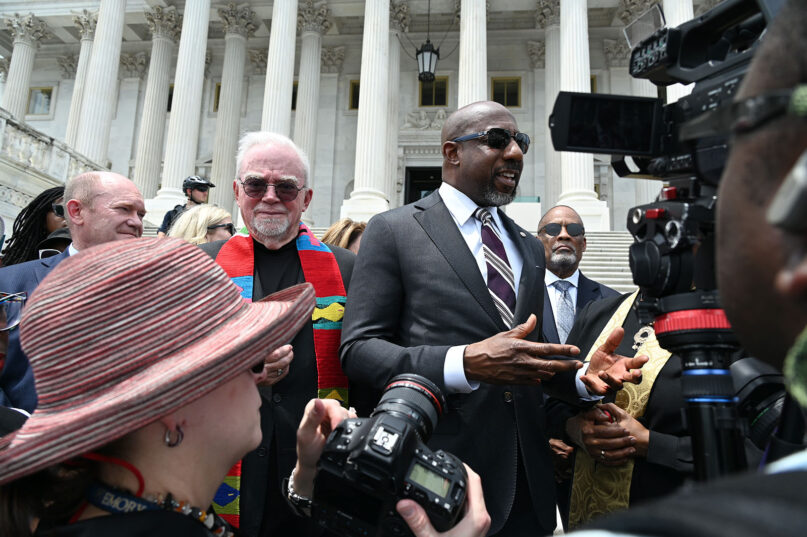
Sen. Raphael Warnock, center, speaks from the steps of the U.S. Capitol during a rally against the “One Big Beautiful Bill Act,” June 10, 2025. (RNS photo/Jack Jenkins)
Warnock, who is a pastor at Ebenezer Baptist Church in Atlanta, recounted how he was arrested in 2017 for protesting a reconciliation bill before he became a senator.
“Here I am, eight years later, having transformed my agitation into legislation, my protest to public policy,” he said. “But I’m here today because I still know how to agitate. I still know how to protest. I’m not a senator who used to be a pastor — I’m a pastor in the Senate.”
Arguing the bill takes “food out of the hungry mouths of children in order to give people like Elon Musk a tax cut,” Warnock noted some senators are churchgoers and he cited the biblical Book of Amos.
“God is not impressed by you quoting Scripture, God is not impressed by you showing up to church on Sunday,” he said. “The test of your faith is the depth of your commitment to the least, the left out.”
Warnock was echoed by Coons, who told Religion News Service he hoped the cries of faith leaders would impact his Republican colleagues.

Sen. Chris Coons speaks from the steps of the U.S. Capitol, June 10, 2025. (RNS photo/Jack Jenkins)
“My hope is that these voices from priests and nuns, from pastors and rabbis from all over our country, reading Scripture — the same Scripture that my colleagues read — will challenge their conscience and test them to reconsider their vote for a bill that will be profoundly harmful to those at the margins of our country,” he said.
Asked if he believed any of his Republican Senate colleagues would be moved to vote against the bill, Coons said yes, arguing that “in many of their home states, rural hospitals will close and emergency rooms will be flooded and families will be hungry” if the bill becomes law.
The lawmakers were flanked by prominent faith leaders who have been critical of President Donald Trump’s administration, such as the Rt. Rev. Mariann Budde, the Episcopal bishop of Washington; the Rev. Barbara Williams-Skinner, coordinator of Faiths United to Save Democracy; the Rev. Jim Wallis, head of Georgetown University’s Center of Faith and Justice; and the Rev. Adam Russell Taylor, head of the Christian social justice advocacy group Sojourners.
Some of the clergy left the event to meet with lawmakers and their staff, hoping to make their case in person.
The gathering followed an earlier rally at a nearby park, where other faith leaders outlined frustrations with the legislation.
“It is a budget that robs from Peter and Paul,” said the Rev. Keith William Byrd Sr., first vice president of the Progressive National Baptist Convention Inc. and pastor of Zion Baptist Church in Washington.
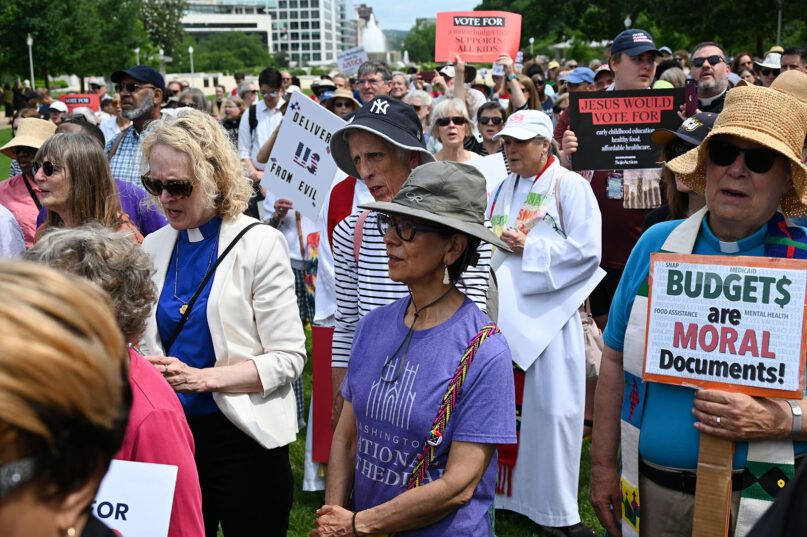
Demonstrators rally against the current budget bill, June 10, 2025, in Washington. (RNS photo/Jack Jenkins)
Byrd criticized the bill for increasing military spending while also cutting programs such as the Supplemental Nutrition Assistance Program, also known as food stamps.
“Lord help us when we can pay for bombs but cannot feed our children,” he said.
The rally followed weeks of advocacy by other religious leaders. Last week, a group of faith leaders primarily from Texas rallied in Washington against a provision of the bill that would include a $5 billion national school voucher program.
“Vouchers are a corruption of God’s common good,” the Rev. Charles Foster Johnson, a Texas pastor, told the crowd.
In an interview with RNS, Johnson — who is head of Bread, a Christian community in Fort Worth — said he was inspired to speak out both because of his faith and his experience in Texas, where the state Legislature recently passed a controversial school voucher provision.

The Rev. Charles Foster Johnson speaks against vouchers during a demonstration near the Capitol, June 4, 2025, in Washington. (RNS photo/Jack Jenkins)
“You go into any community, anywhere in Virginia and Maryland and Texas, and you’ve got two institutions holding that community together: the local school and the local church,” he said. “There is a symbiosis between the two.”
Johnson said he believes Trump intervened to support the Texas voucher bill, but a similar proposed federal program may not be supported by Republican senators such as Deb Fischer of Nebraska, Lisa Murkowski of Alaska, and Susan Collins of Maine. As he finished speaking, Johnson turned and joined other faith leaders as they entered a Senate office building to meet with lawmakers’ staff.
Meanwhile, the Rev. William Barber II and other faith leaders have spent weeks holding “Moral Monday” demonstrations on Capitol Hill against the budget proposal. On three separate occasions, Barber and other faith leaders have been arrested in the Capitol Rotunda while praying against the legislation.
Some religious groups have been selective in their criticism of the bill. In a recent letter sent to elected officials on Capitol Hill, leaders of the U.S. Conference of Catholic Bishops lauded provisions that would prohibit Medicaid funds from going to Planned Parenthood, while also calling on lawmakers to “reconsider provisions that will harm the poor and disadvantaged, our immigrant brothers and sisters, and our environment.”
But leaders of other Catholic groups, such as Network, a Catholic social justice lobby, condemned the bill at the rally on Tuesday, and dissent has emerged among bishops. Last week, Archbishop John Wester of Santa Fe, New Mexico, published an editorial in America Magazine, a Catholic publication, urging his fellow bishops to oppose the bill in its entirety.
“I think the bill is robbing from the poor to give to the rich,” Wester told RNS. “It’s the opposite of the Robin Hood effect.”

A sign during a rally against the current budget bill, June 10, 2025, in Washington. (RNS photo/Jack Jenkins)
Wester took particular issue with how the bill would fund Trump’s immigration agenda, which recently sparked widespread protests in California and elsewhere. Referring to fear expressed by immigrants he knows, he said the U.S. is at an inflection point.
“I feel like we’re in Nazi Germany in 1933,” Wester said.
While Wester said he understood the Catholic church should sometimes be evenhanded about legislation because “politics is the art of compromise,” this budget proposal goes too far.
“To me, this bill is so bad and so mean and so obviously geared toward the rich and against the poor that we can’t do that,” he said. “I fear that by saying, ‘Oh yeah — well, parts of (it) we like and parts we don’t like,’ that kind of gives an implicit green light. There’s no way the Catholic Church can live with this bill. It’s a terrible bill, and it needs to be completely redone.”

Bishop Dwayne Royster, executive director of Faith in Action, speaks during a rally against the current budget bill, June 10, 2025, in Washington. (RNS photo/Jack Jenkins)



